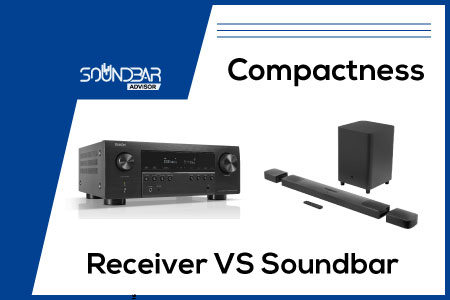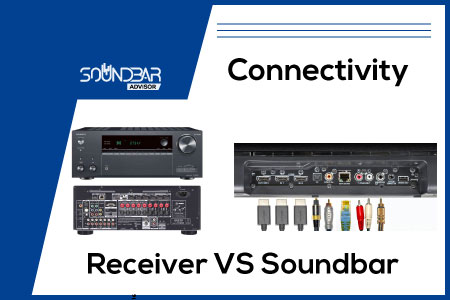When it comes to enhancing your home entertainment experience, audio quality is the most critical thing. Two popular options for achieving better sound quality in your home theater system are soundbars and receivers. Both have their pros and cons and choosing between them can be a confusing thing.
Soundbars are all-in-one audio devices with speakers and amplifiers in one place and are typically placed in front of your TV. They are easy to set up and use, and provide a significant improvement over the built-in speakers.
Receivers are more complex devices that allow you to connect multiple speakers to your TV. This gives you more flexibility in terms of speaker placement and sound quality. However, they are more expensive and difficult to set up than soundbars.
In this comprehensive comparison, we’ll compare soundbar vs receiver and help you make an informed decision for your audio needs.
Quick Difference Among the Soundbar & Receiver
Soundbars and receivers are audio devices that take the audio signals from a source, amplify them, and then play the audio through a speakers system.
Soundbars, as the name suggests, are sleek and compact audio devices designed to improve TV audio. They are a single-unit solution, combining speakers, amplifiers, and sometimes a subwoofer into one streamlined package.
On the other hand, receivers, are larger and more complex devices that act as the central hub for audio and video components in your home theater system. They only act as amplifiers and use separate speakers to play the audio. Whereas, the soundbars have both amplifiers and speakers built-in in their box.
Comparison Table – Soundbar vs Receiver
Here’s a quick overview of the key differences between soundbars and receivers:
| Aspect | Soundbar | Receiver |
| Setup | Easy to set up | More difficult to set up |
| Sound Quality | Good for smaller rooms | Excellent for large spaces |
| Compactness | Compact and space-saving | Bulkier and requires more space |
| Connectivity | Limited input options | Extensive connectivity options |
| Surround Sound | Virtual surround sound | True multi-channel surround |
| Customization | Limited audio settings | Extensive audio customization |
| Upgradability | Limited upgradability | Modular and allows for future upgrades |
| User-Friendliness | Simple setup and operation | Can be complex to set up and configure |
| Price | Generally affordable | Varies widely, can be expensive |
Detailed Comparison – Receiver vs Soundbar
Now, let’s delve deeper into each aspect for a more detailed comparison:
1. Compactness

Soundbars excel in terms of compactness. They are designed to be unobtrusive, often mounting on a wall or sitting discreetly beneath the TV. This makes them ideal for smaller living spaces or minimalist home setups where saving space is a priority.
Receivers, being larger and bulkier, require a dedicated space in your entertainment center. They may not be the best choice if you have limited room for audio equipment or prefer a clutter-free living area.
2. Sound Quality
Soundbars are excellent for smaller rooms or those looking for a simple audio upgrade. They can significantly improve TV audio, offering clearer dialogue and better overall sound than built-in TV speakers.
However, their audio performance may fall short in larger rooms or if you’re seeking a true cinematic experience with powerful bass and surround sound.
Receivers, on the other hand, provide superior sound quality, especially in larger spaces. They can drive multiple speakers for a true surround sound experience, and some models support advanced audio codecs like Dolby Atmos and DTS:X. If you’re an audiophile or a cinephile who values top-notch sound, a receiver is the way to go.
3. Customization
Soundbars typically offer limited audio customization options. They often come with preset sound modes for different types of content (e.g., movies, music, sports), but you have limited control over fine-tuning the audio settings. This simplicity can be convenient for users who prefer a plug-and-play solution.
Receivers provide extensive audio customization. You can adjust equalizer settings, set up different audio profiles, and even calibrate your speakers for optimal sound quality using tools like Audyssey or room correction software. This level of customization allows audiophiles to fine-tune their audio to their preferences and room acoustics.
4. Surround Sound
Many soundbars come with virtual surround sound technology. While they can simulate a wider soundstage, creating a more immersive experience than regular TV speakers, it’s not quite the same as true multi-channel surround sound. Virtual surround sound may not be as convincing in larger rooms.
Receivers can support true multi-channel surround sound setups. With a receiver, you can connect multiple speakers and create a genuine surround sound experience, complete with front, center, rear, and subwoofer channels. This is ideal for those who want an authentic home theater experience with immersive audio.
5. Upgradability
Soundbars are generally not as upgradable as receivers. While you can often add a separate subwoofer for enhanced bass, the soundbar unit itself remains static. This means that if you decide to upgrade your audio system in the future, you may need to replace the entire soundbar.
Receivers offer more flexibility for upgrades. If you want to improve your audio quality, you can replace individual components like speakers or add more channels for a more immersive experience. This modularity allows you to adapt your audio system over time as your needs and budget evolve.
6. User-Friendliness
Soundbars are known for their user-friendly setup and operation. They are designed to be straightforward, making them an excellent choice for those who want a hassle-free audio upgrade without dealing with complex configurations.
Receivers can be more complex to set up and configure due to their numerous options and features. They may require more time and expertise, making them a better choice for users who are willing to invest in learning about audio equipment or who desire advanced customization.
7. Connectivity

Soundbars typically offer limited connectivity options. They usually have HDMI inputs, an optical audio input, and sometimes Bluetooth for wireless connectivity. While this is sufficient for most basic setups, it can be limiting if you have multiple audio sources or complex audio needs.
On the other hand, receivers are known for their extensive connectivity options. They come equipped with multiple HDMI inputs and outputs, analog audio inputs, preamp outputs, and various ports for connecting speakers and subwoofers.
This makes receivers suitable for complex home theater setups with multiple devices like gaming consoles, Blu-ray players, and streaming devices.
8. Price
Soundbars are generally more affordable than receivers. You can find a decent soundbar for under $200, while high-end models may reach $1,000 or more. Receivers, on the other hand, have a wider price range. Basic models can be found for around $300 to $500, while high-end, feature-rich receivers can cost several thousand dollars.
Advantages and Disadvantages
Soundbars
• Compact and easy to place
• Affordable
• Offer a significant improvement over the built-in speakers on your TV
• Many soundbars offer features such as Bluetooth, AirPlay, and HDMI connectivity
• Limited in terms of speaker placement and customization options
Receivers
• More flexibility in terms of speaker placement and customization options
• Offer more features, such as support for multiple surround sound formats and the ability to connect to other audio devices
• More difficult to set up
• Can be bulky and take up more space
Conclusion
In conclusion, the choice between a soundbar vs receiver depends on your specific audio needs and budget. If you want a simple audio upgrade for a smaller space and don’t want to deal with the complexities of multiple speakers and cables, a soundbar is a cost-effective solution.
However, if you’re a home theater enthusiast with a larger room and a passion for exceptional sound quality, a receiver paired with a multi-speaker setup is the way to achieve a true cinematic experience. Ultimately, the decision rests on your priorities and the kind of audio experience you aim to create in your home theater.

Frequently Asked Questions (FAQs)
Which is better AV receiver or soundbar?
It depends on your needs and budget. A soundbar is a good option if you want a simple, affordable audio upgrade for a smaller space. A receiver is a better choice if you want the best possible sound quality and flexibility in terms of speaker placement and customization.
Does a soundbar replace a receiver?
No, a soundbar does not replace a receiver. A soundbar is a single unit that contains all of the speakers, while a receiver is a separate device that amplifies the signal from your TV and sends it to the speakers.
Do soundbars sound better than speakers?
In general, soundbars do not sound as good as speakers. This is because soundbars typically have fewer speakers and less power than a receiver-based system. However, there are some high-end soundbars that can produce very good sound.
Is a soundbar an amplifier or receiver?
A soundbar is not an amplifier or receiver. A soundbar is a single unit that contains all of the speakers, while an amplifier is a device that amplifies the signal from your TV and sends it to the speakers. A receiver is a separate device that amplifies the signal from your TV and sends it to the speakers, as well as providing other features such as surround sound and multi-room audio.
Is a soundbar as good as a home theater system?
No, a soundbar is not as good as a home theater system. A home theater system typically consists of a receiver, multiple speakers, and a subwoofer. This gives you more flexibility in terms of speaker placement and sound quality. However, soundbars are becoming more popular because they are easier to set up and use.
